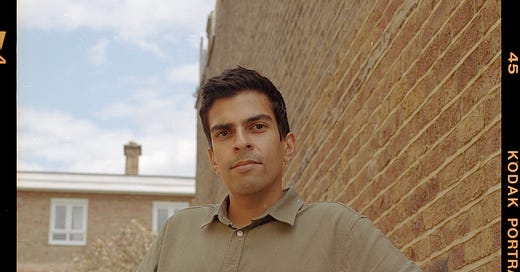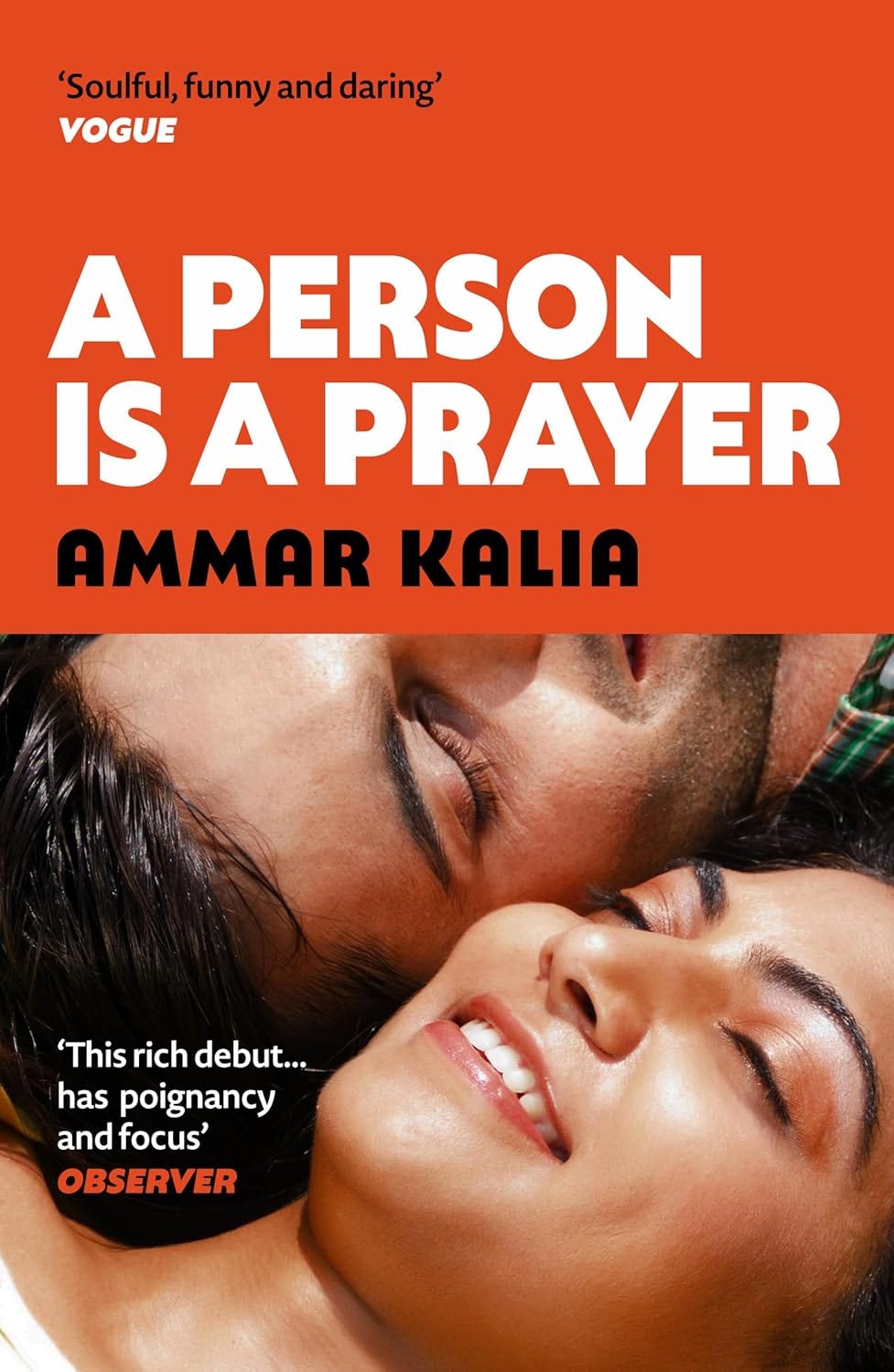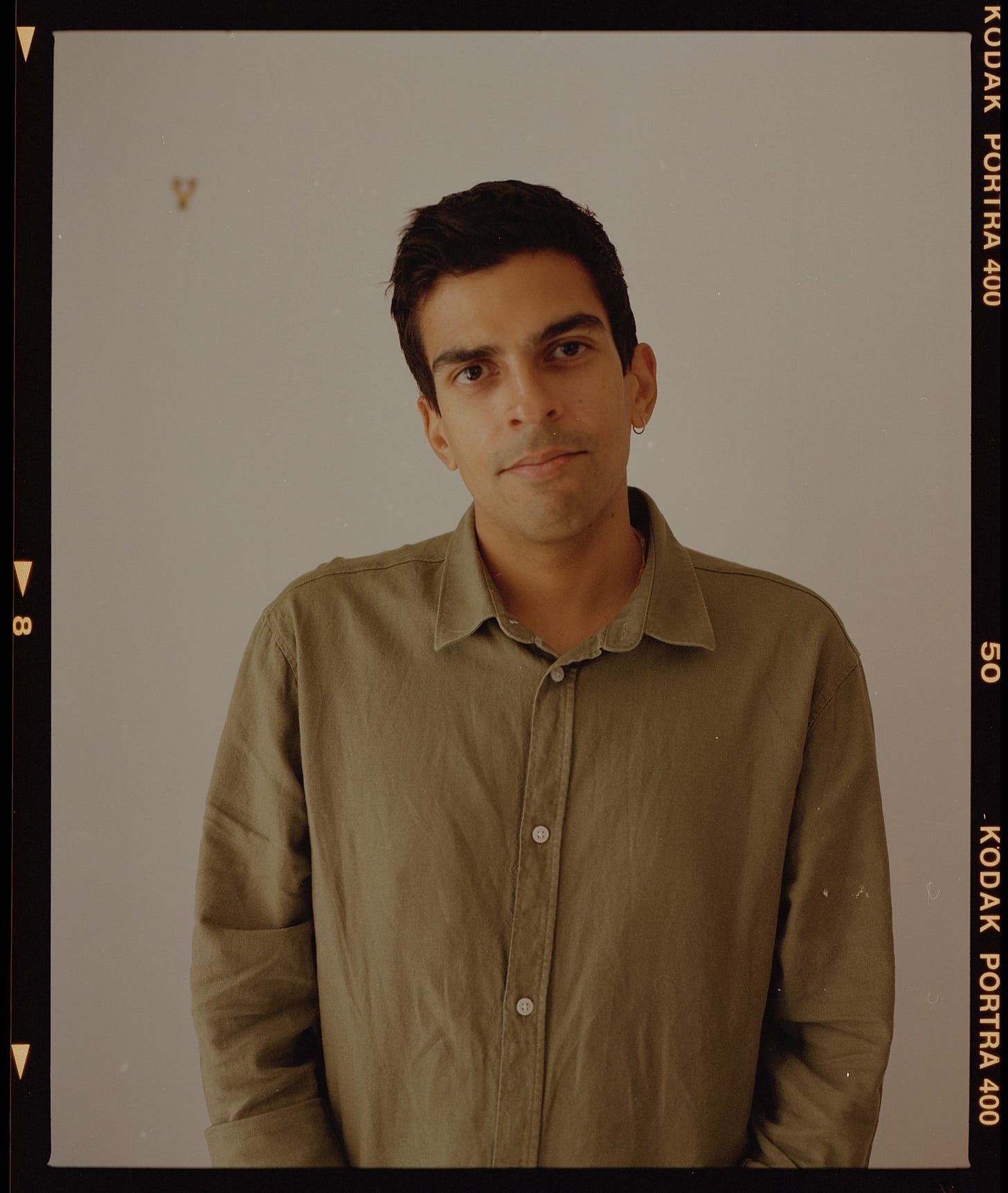Interesting People: Ammar Kalia
This is our regular feature where we ask a few questions to people we find interesting. It’s as simple as that. If there's anyone you think we should be speaking to, then please let us know!
Ammar Kalia released his debut novel A Person Is A Prayer in hardback last year, and ahead of it’s release in paperback next month we thought we would sit down with him to talk about that and more.
If this conversation intrigues you - and we hope it does! - we’ve also got a very special “Book and Beer” deal on our website now where you can order a mixed six pack or twelve pack of the Yam and the paperback of A Person Is A Prayer included for no extra cost.
For any London-based readers, Ammar is in conversation with bandleader, producer and percussionist Sarathy Korwar (who is also performing a live set) on 28 Feb in Hackney. Details are linked beneath the interview.
Gan Yam: Hey Ammar, could you introduce yourself to our readers. Tell us a little bit about where you were brought up, what it was like and any early interests you had.
Ammar Kalia: I was born and brought up in Hounslow, West London. It’s a town mainly known for being grim, grey and the butt of jokes in shows like Goodness Gracious Me and People Just Do Nothing but I really enjoyed being in a place that had so many diverse communities living there. I was a pretty shy, introverted kid but I was always into music from a young age, thanks to my parents’ Motown and soul collections and my older brother’s UK Garage mixtapes and surprising love of soft indie sad boys like Travis and Coldplay. I started learning the tablas when I was around 4 and then picked up the drums at 6, which I’ve been playing ever since.
GY: You’re a musician and writer, which was the first love?
AK: Music, definitely. There’s something so instinctual about making noise and it’s a feeling words can’t replicate. Especially with an instrument like the drums, which doesn’t take much thinking about to make a sound, you can strike and immediately be ‘playing’, even if it sounds shit. You’re always moving forwards, creating something new with each stroke. Whereas writing is much more about craft and consideration, where meaning can be made through deletion as much as addition.
GY: Who were the musicians and writers who made you think it was what you wanted to do, and why?
AK: In terms of drumming, I was a huge fan of Queens of the Stone Age and loved Dave Grohl’s work on Songs For The Deaf, as well as their next drummer Joey Castillo – they both hit hard and with such precision. When I was a teen I got really into jazz, which is mainly what I play now, and my biggest inspiration there is Chris Dave – he has such incredible texture and an intuitive groove to everything he plays. He’s so technical and full of feeling, it really inspired me to keep practising and pushing forwards. With writing, I loved the American postmodernists like Don DeLillo and Paul Auster, as well as playful experimentalists like Ali Smith and Ben Lerner. I don’t think reading their work ever made me think I could be a writer, it was more just something I was in awe of and felt an increasing urge to try out for myself. The more I then wrote, the more I grew to really enjoy the process and with both writing and music, I now do it for my own satisfaction – I don’t think I could live without practising either of them.
GY: You became a music critic a little while back, did you always know you wanted to write novels as well?
AK: Criticism is a weird job, since you’re always on the outside looking in, finding flaws or exciting features about something that someone else has made. If I’m honest, I’ve always been more drawn to making the thing than criticising it, so writing something longform had been on my mind for a long time. As a kid I used to enjoy writing poetry and after university I had a few ideas for books I wanted to try and write. In 2018, I finally decided it was time to get going on one of them and that’s what ultimately became my novel, A Person Is A Prayer.
GY: What similarities, or differences, are there between composing music and literature?
AK: The joy of making music, for me, is that it’s an instinctive process centered on feeling. It’s about following an idea based on what sounds and feels good, rather than what might be the neatest structure or technique for it. That’s why I love jazz – it’s all about honing your technique and skill to then step on stage and put it all to one side so you can just sit and listen to each other while making something totally new in the moment. Writing, meanwhile, is about meaning and craft. When I write, I want to convey feeling but in order to do that I spend a lot of time thinking about sentence rhythm and flow, syntax and character arcs. Writing can be a lot more torturous and it's something I undertake alone, whereas music is usually a collective joy (or frustration).
GY: Tell us about your debut novel, A Person Is A Prayer. It’s been described as semi-autobiographical, can you expand on that?
AK: A Person Is A Prayer first came about after experiencing the deaths of my mum and grandfather and being left with lots of unanswered questions about their lives and our family history. I wanted to know why they migrated from India to Kenya to England, what it must have felt like when they arrived and how they thought their lives had changed since. Those aren’t really the types of conversation most first-gen kids have with their immigrant parents and once it was too late to ask, I ultimately began writing this story based on them, imagining those answers for myself. As I wrote, the story took on a life of its own and the finished manuscript became a kind of exercise in making my own history, or a version of it. The finished book is only autobiographical in that it traces the dates and places that my family moved through but otherwise it’s entirely fictional.
GY: Geographically, the book takes place between India, Kenya and the UK. The Kenyan part of that surprised me at first, was that a common migratory route?
AK: Very common, I think. Since the British Empire had colonised both India and Kenya, their ‘subjects’ were often encouraged to move around the colonies as a way of maintaining power. In my family’s instance, my grandfather was a railway driver and he was offered a better salary and supposedly better quality of life to move to Kenya. When he did, he became part of a three-tier system whereby the white British were the highest social class, then the managerial class of Indians and finally the Kenyans. When Kenya, and famously Uganda, gained independence, there was a push for not only the British but also that upper middle class of Indians to leave too. Rather than go ‘home’, many of those Indians decided to use their British passport and come to the UK instead.
GY: What’s next after A Person Is A Prayer?
AK: I’ve been working on a second novel for the past few years and am hoping to have a finished draft I’m happy with over the next few months. I can’t say too much about it yet but it’s set in a different environment to A Person Is A Prayer and revolves around themes of missing people, airport Duty Free and dementia…
GY: Tell us what to expect at the event on 28 February?
AK: I’m really honoured and excited to have the fantastic Sarathy Korwar join me for this special night. He’s a musician I’ve long known and admired and we’ll be having a conversation about how both of our work interrogates the migrant experience, as well as opening up to an audience Q&A and giving people the chance to buy exclusive paperback copies of my book, a month before they go on sale. We’re also planning on doing a drum duet on the night, so stay tuned for something musically special too!
GY: And, as you’re also a music critic, what should we be listening to now?
AK: I’ve been into the new record by Eddie Chacon recently, which is lovely and soulful for these grey winter days, as well as getting into the new releases from Michael Kiwanuka and John Glazier. An eternal favourite is also DJ Sprinkles, who makes the perfect dubby productions to work to and get down to.
Ammar Kalia and Sarathy Korwar In Conversation and Performance, 28 February, St Peter's Bethnal Green. Tickets available here.








